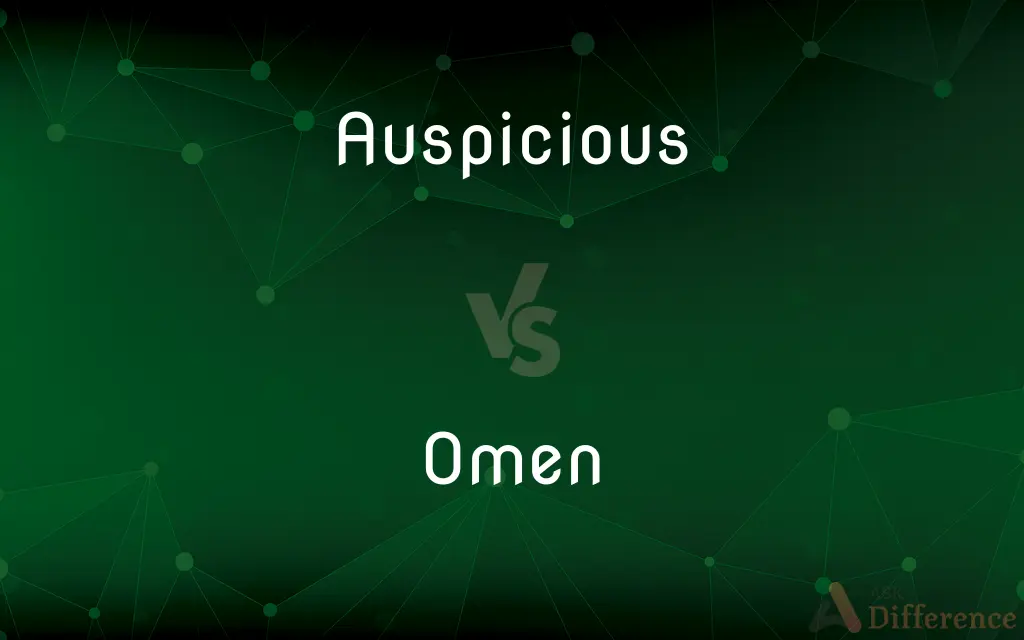Auspicious vs. Omen — What's the Difference?
By Fiza Rafique & Maham Liaqat — Updated on April 2, 2024
Auspicious refers to something that promises success, being a good sign; whereas, an omen can be either good or bad, signifying a future event.

Difference Between Auspicious and Omen
Table of Contents
ADVERTISEMENT
Key Differences
Auspicious is often used to describe situations, events, or signs that are considered to bring a positive outcome or indicate good fortune is on the horizon. It's associated with hopefulness and the anticipation of success. For instance, a clear sky on the day of an important event might be considered auspicious. On the other hand, an omen is a broader term that encompasses any phenomenon or sign believed to foretell the future's positive or negative events. This can range from seeing a black cat, which some cultures interpret as a bad omen, to the sighting of a shooting star, often seen as a good sign.
Auspiciousness is typically linked with specific occasions, such as weddings, business openings, or the start of a new venture, where certain dates, times, or symbols are deemed favorable for success. This concept is deeply embedded in various cultures and traditions, which have their own criteria for what is considered auspicious. Meanwhile, omens are more spontaneous and can occur at any time, being interpreted based on cultural, historical, or personal beliefs about their significance.
While auspiciousness often requires some planning or calculation, such as choosing an auspicious date for a wedding, omens are usually unexpected. People might seek out auspicious dates to enhance the likelihood of success, whereas omens are encountered rather than chosen.
Auspicious times or symbols are often celebrated and actively sought after, with people going to great lengths to ensure their actions align with what is considered propitious. Conversely, omens, especially bad ones, are typically feared or avoided, with various rituals or actions taken to avert the predicted misfortunes.
In the realm of personal belief and interpretation, what one considers auspicious might not be universally agreed upon, with variations across different cultures and individuals. Similarly, the interpretation of omens is highly subjective, with the same sign being seen as positive in one culture and negative in another.
ADVERTISEMENT
Comparison Chart
Definition
Signifying good luck or favorable conditions for success.
A sign or warning that something, either good or bad, will happen in the future.
Nature
Always positive.
Can be positive or negative.
Occurrence
Often sought after and planned (e.g., choosing a date).
Spontaneous, without intention.
Cultural Association
Varies by culture, but generally linked to specific actions or events.
Varies widely, with interpretations dependent on cultural or personal beliefs.
Impact on Behavior
Encourages engagement in activities believed to be auspicious.
May lead to avoidance or engagement in rituals to avert or embrace the foretold future.
Compare with Definitions
Auspicious
Marked by lucky signs or good omens.
The sunny morning was considered an auspicious start to their journey.
Omen
Sign or signal of a future occurrence.
The broken mirror was taken as an omen of bad luck.
Auspicious
Favorable and indicative of success.
Choosing an auspicious date for their wedding was important to them.
Omen
A sign predicting the future, either good or bad.
They took the eclipse as an omen of change.
Auspicious
Promising success.
The deal's auspicious beginnings led to a profitable partnership.
Omen
Indicative of a future event.
Many consider a black cat crossing your path to be a bad omen.
Auspicious
Bringing good luck.
They moved into their new home on an auspicious day.
Omen
An occurrence or phenomenon believed to foretell an event.
The appearance of a comet was seen as an omen.
Auspicious
Associated with positive outcomes.
Her auspicious arrival signified the turn of events in our favor.
Omen
A warning or prophecy.
The sudden storm was interpreted as an omen of difficult times ahead.
Auspicious
Conducive to success; favourable
It was not the most auspicious moment to hold an election
Omen
An omen (also called portent or presage) is a phenomenon that is believed to foretell the future, often signifying the advent of change. It was commonly believed in ancient times, and still believed by some today, that omens bring divine messages from the gods.These omens include natural phenomena, for example an eclipse, abnormal births of animals (especially humans) and behaviour of the sacrificial lamb on its way to the slaughter.
Auspicious
Presenting favorable circumstances or showing signs of a favorable outcome; propitious
An auspicious time to ask for a raise.
Omen
An event regarded as a portent of good or evil
A rise in imports might be an omen of recovery
The ghost's appearance was an ill omen
Auspicious
Of good omen; indicating future success.
Omen
A phenomenon supposed to portend good or evil; a prophetic sign.
Auspicious
Conducive to success.
This is an auspicious day.
Omen
Prognostication; portent
Birds of ill omen.
Auspicious
Marked by success; prosperous.
Omen
To be a prophetic sign of; portend.
Auspicious
Having omens or tokens of a favorable issue; giving promise of success, prosperity, or happiness; predicting good; as, an auspicious beginning.
Auspicious union of order and freedom.
Omen
Something which portends or is perceived to portend either a good or evil event or circumstance in the future, or which causes a foreboding; a portent or augury.
The ghost's appearance was an ill omen.
A rise in imports might be an omen of economic recovery.
The egg has, during the span of history, represented mystery, magic, medicine, food and omen.
Auspicious
Prosperous; fortunate; as, auspicious years.
Omen
A thing of prophetic significance.
A sign of ill omen.
Auspicious
Favoring; favorable; propitious; - applied to persons or things.
Omen
(transitive) To be an omen of.
Auspicious
Attended by favorable circumstances;
An auspicious beginning for the campaign
Omen
(intransitive) To divine or predict from omens.
Auspicious
Tending to favor or bring good luck;
Miracles are auspicious accidents
Encouraging omens
A favorable time to ask for a raise
Lucky stars
A prosperous moment to make a decision
Omen
An occurrence supposed to portend, or show the character of, some future event; any indication or action regarded as a foreshowing; a foreboding; a presage; an augury.
Bid go with evil omen, and the brandOf infamy upon my name.
Omen
To divine or to foreshow by signs or portents; to have omens or premonitions regarding; to predict; to augur; as, to omen ill of an enterprise.
The yet unknown verdict, of which, however, all omened the tragical contents.
Omen
A sign of something about to happen;
He looked for an omen before going into battle
Omen
Indicate by signs;
These signs bode bad news
Common Curiosities
What is an auspicious sign?
An auspicious sign is a symbol or event considered to bring good luck or indicate a favorable outcome.
How do cultures determine what is auspicious?
Cultures have various criteria, often based on historical, astrological, or spiritual beliefs, to determine auspiciousness.
Can the same sign be both auspicious and an omen?
Yes, a sign can be considered both, depending on its context and the cultural or personal interpretation.
Can an omen be positive?
Yes, omens can be positive, predicting good events, or negative, warning of bad ones.
Why are some omens considered bad?
Some omens are considered bad based on cultural associations, historical events, or collective beliefs linking them to negative outcomes.
Can auspiciousness change over time?
Yes, what is considered auspicious can evolve with cultural shifts, changing beliefs, and new interpretations.
What's the difference in response to auspicious vs. ominous signs?
Auspicious signs are often welcomed and sought after, while ominous signs may be feared or lead to efforts to avert the predicted outcomes.
How do you choose an auspicious date?
Choosing an auspicious date often involves consulting calendars, astrological charts, or cultural traditions to find times deemed lucky or favorable.
Is belief in auspiciousness and omens universal?
While not universal, many cultures and individuals hold beliefs in auspicious signs and omens, though interpretations vary.
Do omens predict the future?
Omens are believed by some to predict the future, but their interpretation and belief in their predictive power vary widely.
How does one react to a bad omen?
Reactions can range from performing rituals to avert bad luck to simply ignoring it, depending on personal or cultural beliefs.
Can anyone predict an omen?
Omens are typically spontaneous; their prediction or recognition depends on cultural or personal belief systems.
Are auspicious signs the same worldwide?
No, what is considered auspicious can vary significantly across different cultures and regions.
How do personal beliefs affect the interpretation of omens and auspicious signs?
Personal beliefs greatly influence how individuals interpret and react to omens and auspicious signs, with the same sign being seen positively by some and negatively by others.
What role does astrology play in auspiciousness?
Astrology often plays a significant role in determining auspicious times and dates for various activities.
Share Your Discovery

Previous Comparison
Critical vs. Crucial
Next Comparison
Overweight vs. PlumpAuthor Spotlight
Written by
Fiza RafiqueFiza Rafique is a skilled content writer at AskDifference.com, where she meticulously refines and enhances written pieces. Drawing from her vast editorial expertise, Fiza ensures clarity, accuracy, and precision in every article. Passionate about language, she continually seeks to elevate the quality of content for readers worldwide.
Co-written by
Maham Liaqat














































